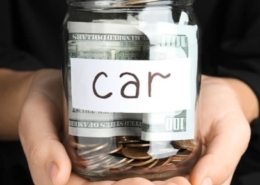What New Car Dealer Fees Should You Pay in 2024?
What fees should you expect to pay when you buy a new car and which ones are bogus charges?
Car dealers are undoubtedly experts at “nickel-and-diming” you to death with additional fees when buying a new car. However, legitimate state and regional fees are required by law, depending on the region you live in. But how do you know what new car dealer fees you should pay and which ones you should avoid in 2024?
These fees vary from state to state, you can negotiate some, and some are your responsibility to pay. Let’s examine what new car dealer fees are legitimate and which are not.
New Car Price Tip: It’s challenging to find a new car at a reasonable price nowadays. Car buyers frequently pay more than the suggested retail price. You can still get a good deal in your area if you compare prices with an online shopping service like RydeShopper or Edmunds.
What is a Documentation Fee (Doc Fee)?
All dealers charge some documentation fee; the Doc Fee covers the cost of office personnel doing the paperwork after selling a new or used car.
Most reputable car dealerships charge anywhere from $50 to $500, and the fee usually is not brought to your attention until you sign the paperwork for your vehicle.
Documentation fees (or doc fees) vary from state to state, and some states have a maximum limit a dealer can charge. The lowest average is $75 in New York, with the highest standard in Florida at $670.
More about Doc Fees:
- Aonal fees and other charges are very sketchy because you’ve done your homework and negotiated the best possible deal. Then, when you sign your paperwork, there’s a higher price than agreed upon.
- A doc fee of $500 can raise your monthly payment by approximately $10 a month, depending on your loan term and interest rate.
- Some dealers will negotiate this additional charge with you; if you find one that will remove the fee, they will most likely discount the car the exact amount and leave the doc fee on the paperwork.
- You will also find the doc fee on your paperwork if you buy a used car.
- Every vehicle sold in a dealership will have a doc fee included.
Real-Time Bargain Hunting: Turn to Edmunds for instant access to the latest and greatest local deals, saving you time, money, and stress.
State Vehicle Registration Fees
The amount the state charges to register a new car also covers title assignment and the cost of license plates.
After you’ve purchased the vehicle, the dealership saves you a trip to the Department of Motor Vehicles or Registry by providing this service.
The vehicle registration fee will vary depending on the price of the vehicle; usually, the more expensive the car, the higher the registration fee will be.
These charges are generally not negotiable with the dealer; however, a dealer may have a sale or special where they will throw in the registration fee. They may treat it as the doc fee, leave it on the paperwork, and discount the price of the vehicle an equal amount.
State Sales Tax on Vehicle Purchases
Sales tax on a vehicle can be costly; some states will allow you to finance your tax, title, and registration, and others will make you pay it later at the DMV, registry, or tag agency.
Many dealers are tight-lipped regarding taxes in jurisdictions where you must pay them out of pocket during or after the transaction.
The dealer knows once you sign the contract, the vehicle is yours, and they don’t want to risk losing a deal because you’re worried about paying the taxes on the car.
For example, sales tax on a $28,000 vehicle at 7 percent would be $1,960. Most counties and cities will add a quarter percent so that the amounts may vary within different areas within your state.
More about state sales taxes:
- I advise you not to roll your TT&L (tax, title, and license) into your car loan. You will end up paying more in interest if you do. Include the TT&L amount for your 15-20% cash-down payment. This will save you money and help you pay the vehicle off much faster.
- Tax charges also vary from state to state; some states will charge taxes on the total price of the vehicle, and some will only charge tax on the trade difference (the amount leftover from the purchase price minus your trade amount).
New Car Regional Advertising Fees
All car dealers must participate in regional advertising to promote the dealers within their region. The fee is how manufacturers pay for those lovely and flashy car dealer ads you see on national television that invite you to visit your local area dealer.
Advertising is a massive part of a dealership’s budget; amounts can vary per region and run anywhere between $250 to $400 or more.
The rule is you’re responsible for the regional advertising fee, and most dealers will not negotiate the amount, but you never know how badly a dealer wants to move a vehicle, so I’d at least make a run at them.
More about regional advertising fees:
- Some manufacturers, like Honda, build the fee into the factory invoice price. Others, like Toyota, may list the charge as a separate line item and disguise it with initials like TDA (Toyota Dealer Advertising Fee) or FDAF (Ford Dealer Advertising Fund).
- One thing to watch for is unethical dealers trying to pass off their in-house advertising fees by listing them on the purchase order. Remember, regional advertising fees are separate from dealers’ expenses for advertising their vehicles. The cost of in-house advertising is not charged to the consumer as a different fee.
- You will want to proceed with caution when an advertising fee is not listed on the invoice, but the dealer includes it within the final price of the vehicle. They may attempt to double-dip you for the cost or stick you with another BS fee.
- An easy way to determine if an advertising fee is legit is to call other same-brand dealers in the same region and ask them how much the cost is on the car you want to buy.
Trade-in Taxes
Some states will give you a tax break when you trade in your car. They do this by only taxing you on the “trade difference.” This is the balance after subtracting the amount you received from your trade-in.
Here’s how it works:
$28,000 (New Car Price)
– $10,000 (Trade-in Amount)
= $18,000 (Taxable Trade Difference / Pay Tax on This Amount)
Your trade difference of $18,000 is the amount you will pay taxes on.
If you see a “P” in the chart below, this is how your state handles taxes. If your state has a “T” in the tax column, your trade has no bearing on the transaction, and you must pay sales tax on the total amount of your new car purchase.
$28,000 (New Car Price / Pay Tax on This Amount)
– $10,000 (Trade-in Amount)
= $18,000 (Trade Difference)
Customer Cash and New Car Rebates
Some of the most significant discounts you may run across when purchasing a new car are new car customer rebates and incentives. These types of discounts reduce the purchase price of the vehicle.
Most states charge sales tax on the total purchase price of the vehicle BEFORE the rebate is applied to discount the vehicle. For example, a $28,000 car with a $1,500 cash rebate reduces the vehicle’s sales price to $26,500. However, you’ll still pay sales tax on the original purchase price of $28,000.
Some states charge sales tax after the rebate is applied. The car dealer fee chart below is in the “Are Rebates Taxed?” column. A “Y” in the column means sales tax is calculated on the vehicle’s purchase price before the incentive is applied.
State Limits for New Car Dealer Fees and Taxes
The chart below will not allow you to calculate an exact vehicle cost. It will help you understand what you will pay when buying a vehicle in your area.
Registry fees are tricky to calculate; you can visit your state’s Department of Motor Vehicles (DMV) website and use their calculator.
Most states also charge minor environmental laws (less than $50). Documentation fees change frequently.
I do my best to keep the chart updated. Please let me know if you know of any updates, and I will make the necessary changes.
I’ve added this handy car dealer fee chart to help you see the estimated average documentation fees (doc fees) charged by dealers in each state.
Use caution with states that don’t have a maximum limit; unscrupulous dealers can mark up the doc fee as high as they want to scam an unsuspecting buyer.
You can use it to determine if the dealer you’re buying a car from is charging close to the average of what other dealers trust in the area.
2024 New Car Dealer Fee and Tax Chart
| State | Max sales tax | Ave DMV fees | Trade-In tax credit? | Rebates taxed? | Doc fee limits | Ave doc fee |
|---|---|---|---|---|---|---|
| Alabama | 11% | $363 | P | Y | No Max | $499 |
| Alaska | 7.50% | $100 | P | N | No Max | $200 |
| Arizona | 11.20% | $532 | P | N | No Max | $429 |
| Arkansas | 11.25% | $34 | P | Y | $129 | $129 |
| California | 10.25% | $296 | T | Y | $80 | $80 |
| Colorado | 11.20% | $598 | P | Y | No Max | $598 |
| Connecticut | 6.35% | $107 | P | Y | No Max | $499 |
| Delaware | 0% | $1,553 | P | N | No Max | $292 |
| District of Columbia | 5.75% | $124 | T | Y | No Max | $300 |
| Florida | 8% | $294 | P | Y | No Max | $799 |
| Georgia | 8.90% | $2,465 | P | Y | No Max | $599 |
| Hawaii | 4.7120% | $108 | T | Y | No Max | $245 |
| Idaho | 9% | $62 | P | Y | No Max | $299 |
| Illinois | 11% | $196 | P | Y | $169 | $169 |
| Indiana | 7% | $21 | P | Y | No Max | $198 |
| Iowa | 7% | $365 | P | N | $180 | $180 |
| Kansas | 10.60% | $47 | P | N | No Max | $399 |
| Kentucky | 6% | $21 | T | N | No Max | $450 |
| Louisiana | 11.45% | $138 | P | N | $200 | $200 |
| Maine | 5.50% | $873 | P | Y | No Max | $499 |
| Maryland | 6% | $258 | T | Y | $500 | $495 |
| Massachusetts | 6.25% | $135 | P | N | No Max | $395 |
| Michigan | 6% | $259 | T | Y | $210 or 5% of price, whichever is less | $210 |
| Minnesota | 8.38% | $464 | P | N | $75 | $75 |
| Mississippi | 8% | $39 | P | Y | No Max | $260 |
| Missouri | 10.10% | $45 | P | N | $199.99 | $199 |
| Montana | 0% | $577 | T | N | No Max | $299 |
| Nebraska | 7.50% | $571 | P | N | No Max | $299 |
| Nevada | 8.27% | $550 | P | Y | No Max | $499 |
| New Hampshire | 0% | $60 | P | N | No Max | $372 |
| New Jersey | 6.63% | $133 | P | Y | No Max | $399 |
| New Mexico | 9.06% | $65 | P | Y | No Max | $339 |
| New York | 8.88% | $86 | P | Y | $75 | $75 |
| North Carolina | 3.00% | $88 | P | Y | No Max | $599 |
| North Dakota | 8.50% | $103 | P | Y | No Max | $299 |
| Ohio | 8% | $39 | P | Y | $250 or 10% of price, whichever is less | $250 |
| Oklahoma | 11.50% | $107 | P | N | No limit | $299 |
| Oregon | 0% | $187 | P | N | $115 or $150 if filed electronically | $75 |
| Pennsylvania | 7% | $87 | P | N | $113 or $134 if filed electronically | $134 |
| Rhode Island | 7% | $32 | P | N | $200 | $220 |
| South Carolina | 9% | $39 | P | Y | No Max | $350 |
| South Dakota | 6.50% | $48 | P | Y | No Max | $129 |
| Tennessee | 10% | $35 | P | Y | No Max | $500 |
| Texas | 8.25% | $94 | P | N | No Max | $150 |
| Utah | 8.60% | $154 | P | N | No Max | $299 |
| Vermont | 7% | $70 | P | N | No Max | $180 |
| Virginia | 7% | $53 | T | Y | No Max | $599 |
| Washington | 10.40% | $57 | P | Y | $150 | $150 |
| West Virginia | 7% | $40 | P | Y | $175 | $175 |
| Wisconsin | 5.60% | $145 | P | Y | No Max | $229 |
| Wyoming | 6% | $659 | P | N | No Max | $500 |
State table column definitions:
- Max sales tax: In most states, you may pay state, county, and local taxes. Remember, this is the MAXIMUM tax you could be charged in each state.
- Ave DMV fees: These amounts are the approximate amount it will cost you to register your new vehicle within the state you currently reside in.
- Trade-In tax: If there is a “T” in the column, you will pay to take on the total amount of your new car purchase price. If there is a “P” in this column, you will only pay sales tax on the trade difference ( the difference between your new car purchase and your trade-in value), saving you money.
- Rebates taxed?: A “Y” in this column means that the buyer will pay tax on the purchase price before the manufacturer’s cash rebate is applied.
- Doc fee limits: This will tell you if the state regulates the documentation fee and the maximum amount allowed by state law.
- Ave doc fee: The typical amount you can expect to pay for a dealer doc fee per state.
Further Tips and Advice About Dealer Fees
- State fees and how your vehicle purchase is taxed will vary depending on your region and state.
- Don’t be caught off guard; always ask beforehand what fees are associated with buying a car in your local area. These charges can be anywhere from a few dollars to a few thousand dollars.
- An excellent way to find this information is to ask for an itemized list from the dealership you’re buying the car from. Any legitimate car dealership should be able to email this list to you when requested.










